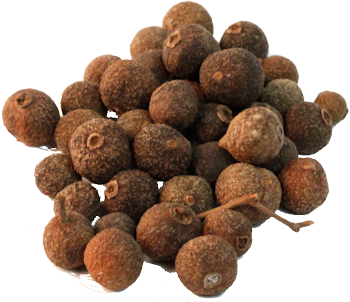|
The active
principles in the allspice found to have anti-inflammatory, rubefacient
(warming and soothing), carminative and anti-flatulent properties.
Allspice contains
many health benefiting essential oils such as eugenol, a phenylpropanoids class
of chemical compound, which gives pleasant, sweet aromatic fragrances to this
spice. It also contains caryophyllene, methyleugenol, glycosides, tannins,
quercetin, resin and sesquiterpenes. These volatile oils obtained through
distillation process using this spice corns. The outer coat of the berries is
believed to have the greatest medicinal activity.
As in black
pepper corns, the active principles in the allspice may increase the motility
of the gastro-intestinal tract as well as increase the digestion power by
increasing gastro-intestinal secretions.
Eugenol, has
local anaesthetic and antiseptic properties, hence; useful in gum and dental
treatment procedures. Recent research studies have shown that preparation made
from allspice oil mixed with extractions from garlic and oregano can work
against E.coli, Salmonella and L.monocytogenes infections.
The spice is
enriched with good amount of minerals like potassium, manganese, iron, copper,
selenium, and magnesium. Iron is an important co-factor for cytochrome-oxidase
enzymes during cellular metabolism. It is also required for red blood cell
production in the bone marrow. Being an important component of cell and body
fluids, potassium helps control heart rate and blood pressure. Manganese is
used by the body as a co-factor for the powerful antioxidant enzyme, superoxide
dismutase.
The spice also
contains very good amounts of vitamin-A, vitamin B-6 (pyridoxine), riboflavin,
niacin and vitamin-C. Vitamin C is a powerful natural antioxidant; regular
consumption of foods rich in vitamin C helps body develop resistance against
infectious agents and scavenge harmful, pro-inflammatory free radicals.
Anti-Inflammatory
Qualities: One of the most celebrated aspects of
allspice is its ability to lower inflammation and alleviate pain in parts of
the body. The active ingredients in the spice have chemical compounds that
eliminate inflammation, making it an ideal spice to give you some relief from
arthritis, gout, muscle aches, or even haemorrhoids. Allspice also has certain
analgesic components that allow for pain reduction in the case of injury or
surgical recovery.
Digestion: The calming, rubefacient effects of allspice’s organic
components make it perfect for soothing the stomach and also facilitating
healthy digestion. The eugenol found in allspice can eliminate digestive issues
such as diarrhoea, nausea, vomiting, and constipation, while also stimulating
regularity, which reduces bloating and excess flatulence. The anti-inflammatory
aspect of allspice further eases cramps, which can ease the entire process of
digestion.
Immune System: Research has shown certain antibacterial and antifungal effects
of allspice, particularly in terms of stomach bacteria (E. coli and Listeria
monocytogenes). In addition to helping the gastrointestinal system function
smoothly, it also protects it from outside attack through a natural immune
response. Furthermore, when allspice is added to certain foods, it can
neutralize the bacteria at that level, before it ever enters your body to begin
doing damage.
Antioxidant
Capacity: The presence of eugenol, quercetin, tannins,
and other chemical compounds makes allspice a very potent antioxidant, as many
of those substances are perfect for neutralizing free radicals and eliminating
them from the body. Free radicals are the harmful by-products of cellular
metabolism that can cause healthy cells to mutate, often leading to serious
diseases – even cancer. The high level of vitamin C and vitamin A present in
allspice also contribute to this antioxidant activity.
Dental Health: The antimicrobial, antibacterial, and antiseptic aspects of
allspice can help to boost your dental health; although gargling with this
spice wouldn’t be particularly pleasant, it has been connected to healthier
dental and gum health by protecting against bacterial pathogens.
Circulation: With significant levels of copper and iron, allspice is ideal
for boosting circulation, as these are essential components of red blood cells.
Furthermore, the rubefacient aspect of the spice is a stimulant, and warms the
body. Combined with increased blood flow, this can result in additional energy
and the proper oxygenation of extremities in the body. Iron also functions in
the creation of certain enzymes that are crucial for overall metabolism.
Heart Health: The potassium found in allspice has a positive effect on heart
health, as it is a vasodilator and releases much of the tension on the
cardiovascular system. This causes an increase in blood flow through the
relaxed blood vessels and reduces the strain on the arteries and heart, thereby
lowering the chances of developing atherosclerosis, and subsequently, strokes
and heart attacks.
A Final Word of Warning: Although it is clearly a healthy, beneficial spice, it can cause
serious allergic reactions in hypersensitive individuals. Also, if you have
existing gastric ulcers or ulcerative colitis, it is best to avoid using this
spice, as it can exacerbate the conditions. As always, before making any major
change to your diet or trying out new things, consult a medical professional to
make sure the effects won’t be negative.
|

